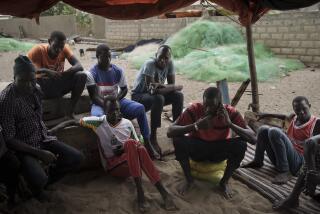Crossing Risky Waters : The Mundane Becomes Deadly Serious on Sri Lankan Ferry
- Share via
VAVUNIYA, Sri Lanka — Every day they risk their lives to visit relatives, look for jobs or buy goods.
Such mundane tasks become deadly serious for residents of Sri Lanka’s northern Tamil rebel-controlled Jaffna peninsula, who must make the hazardous 75-mile journey to Vavuniya town on the mainland.
The only available route is across the Kilali lagoon, declared off-limits by the military to prevent rebel movements. The military has said it will attack any boats crossing it.
Nevertheless, the day before a recent Hindu festival as many as 4,000 people made the journey, just days after 15 people were killed when the navy fired on a flotilla of boats it said were being used by rebels. Tamil politicians claimed 39 were killed.
The military prefers that civilians use a land route past an army camp, but the Liberation Tigers of Tamil Eelam guerrillas have mined that road.
The rebels, fighting for a separate Tamil homeland in the island’s north and east, fear that the army will move into Jaffna if the mines are removed.
Neither side is willing to back down and provide a safe route. Military officials in Vavuniya pretend that they don’t know how people travel from Jaffna, but one officer said privately that for humanitarian reasons they do not shoot at all boats.
“We have said that anyone who uses the lagoon does so at their own risk, and they can’t complain if something happens,” said government spokesman Ranil Wickremasinghe.
In January, Colombo’s Anglican Bishop Kenneth Fernando traveled to Jaffna for talks with the Tigers. He admitted that he had gone via the lagoon.
Asked at a news conference whether he had broken the law by using a forbidden route, the bishop merely smiled.
Fernando appealed to the Tigers and the government to find a way to allow civilians to cross safely.
Father Donald Kanagaratnam, a priest in Vavuniya, the first army-controlled town south of the peninsula, said a quick solution must be found.
“People have to travel to and fro for urgent business. It is the ordinary people who are suffering,” he said.
The blockade has also caused more hardship for the peninsula’s 800,000 inhabitants, who are short of food, fuel and medicine.
People going to Jaffna from Vavuniya have to go through a tedious process of checking to see if they are carrying any of the military’s many banned items.
One morning’s haul at the final checkpoint included toy soldiers, exercise books, mothballs and clothes pegs.
K. Navalasvaran, a government employee in Jaffna, said he made the journey to contact his son in Germany.
“It is frightening and dangerous, but I had no choice,” he said.
More to Read
Sign up for Essential California
The most important California stories and recommendations in your inbox every morning.
You may occasionally receive promotional content from the Los Angeles Times.









